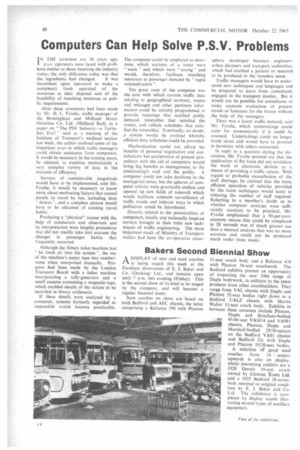Computers Can Help Solve P.S.V. Problems
Page 42

If you've noticed an error in this article please click here to report it so we can fix it.
IN THE turbulent era 30 years ago. 1 p.s.v. operators were faced with problems similar to those besetting the industry today; the only difference today was that the ingredients had changed. It was incumbent upon operators to make a completely fresh appraisal of the resources at their disposal and of the feasibility of matching resources to public requirements.
After these comments had been made by Mr. D. L. Fytche, traffic manager of the Birmingham and Midland Motor Omnibus Co. Ltd. (Midland Red), in a paper on "The PSV Industry—a Turbu lent Era? read at a meeting of the Institute of Transport's midland section last week, the author outlined some of the important ways in which traffic managers could obtain assistance from computers. It would be necessary in the coming years, he claimed, to examine meticulously a very complex variety of data in the interests of efficiency.
Surveys of considerable magnitude would have to be implemented, said Mr. Fytche; it would be necessary to know more about motivating factors that caused people to travel by bus, including their " desires ", and a complete picture would have to be obtained of existing travel habits.
Producing a "physical" census with the help of conductors and observers and its interpretation were lengthy procedures that did not readily take into account the changes in passenger habits that frequently occurred.
Although the Almex ticket machine had " let fresh air into the system ", the use of the machine's paper tape was cumbersome when interpreted manually. Progress had been made by the London Transport Board with a ticket machine incorporating a tally-generator and a small cassette containing a magnetic tape, which enabled details of the tickets to be recorded in binary arithmetic.
If these details were analysed by a computer, systems formerly regarded as impossible would become practicable. The computer could he employed to determine mine which sections of a route were "
weak" and which were " strong 'S and would, therefore, facilitate matching resources to passenger demand by 'rapid rationalization ".
The great asset of the computer was the ease with which current traffic data relating to geographical territory, routes and mileages and other pertinent information could be suitably programmed to provide routeings that satisfied public demand, timetables that satisfied the routes, and vehicle schedules that satisfied the timetables. Eventually, no doubt. A system would be evolved whereby efficient duty schedules could be provided.
Mechanization could not afford the benefits of personal negotiation and consultations but acceleration of present procedures with the aid of computers would bring big benefits to management, to the undertaking's staff and the public. A computer could not take decisions in the managerial sense; but the spheres of computer activity were practically endless and opened up new fields of research which • would facilitate constant surveillance of traffic trends and indicate ways in which palliatives could be introduced.
Directly related to the potentialities of computers, locally and nationally inspired surveys brought in their train new techniques of traffic engineering. The most important result of Ministry of Transport studies had been the co-operative atmo sphere developed between engineers. urban planners and transport authorities, which had enabled a pattern or research to be produced in the broadest sense.
Traffic managers would have to understand new techniques and languages and be prepared to learn from consultants engaged in the transport studies. But it would not be possible for consultants to make accurate evaluation of present trends or forecasts for the future without the help of the managers.
There was a latent traffic demand, said Mr. Fytche, which undertakings could cater for economically if it could be assessed. Undertakings could no longer stand alone and would have to proceed in harmony with others concerned.
In reply to a question during the discussion, Mr. Fytche pointed out that the application of fiat fares did not invalidate the work of electronic devices as a means of providing a traffic census. With regard to probable exacerbation of the staff shortage, he claimed that the more efficient operation of vehicles provided by the latest techniques would assist in reducing the number of staff required. Referring to a member's doubt as to whether computer analyses were sufficiently accurate to be practical, Mr. Fytche emphasised that a 90-per-centaccurate census that could be completed in 20 seconds was of much greater use than a manual analysis that was no more accurate and could not be produced much under three weeks.
















































































































